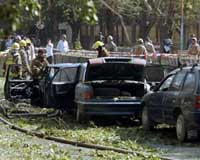| . |  |
. |
Kabul, Afghanistan (UPI) Aug 5, 2010 Each day between 25 and 50 Afghan civilians, Afghan, coalition and U.S. soldiers are wounded or killed by the Taliban. For many years it has been an open secret that Pakistan, in particular its Inter-Services Intelligence agency, has been supporting and advising the Taliban. It isn't diplomatic to say so but perhaps the time to start playing hardball with Pakistan is long overdue. Harvard University's Matt Waldman has made a valuable contribution to the debate involving Pakistan's complicity in supporting the insurgency in Afghanistan and its duplicity in its relationship with the United States and the other coalition nations. In his discussion paper "The Sun in the Sky: The Relationship Between Pakistan's ISI and Afghan Insurgents," Waldman states: "Although the Taliban has a strong endogenous impetus, according to Taliban commanders the ISI orchestrates, sustains and strongly influences the movement. They say it gives sanctuary to both Taliban and Haqqani groups, and provides huge support in terms of training, funding, munitions and supplies. In their words, this is 'as clear as the sun in the sky.'" According to Stephen Philip Cohen, in the aftermath of the 1971 India-Pakistan War, Pakistan took measures to increase Islamicization of society through proliferation of madrassas and greater support for militant groups to be used as proxies to challenge India in Kashmir and secure its western flank in Afghanistan. Pakistan's current policy regarding the Taliban isn't without historical precedent, but it has been the natural evolution of its direct involvement in Afghanistan supporting Sunni Muslim mujahedin groups in their jihad against the Soviets. As Ahmed Rashid has noted, Pakistan provided significant political, financial, military and logistical support to the former Taliban regime in Afghanistan (1996-2001). Even in 2001, in breach of U.N. sanctions, "up to 30 ISI trucks a day were still crossing into Afghanistan." The Pakistani venture in Islamicization and its support of the Afghan Taliban in no small part spawned the Tehrik-e-Taleban-e-Pakistan, which ironically has begun to attack the Pakistan government itself. It is interesting to note that the recent Pakistani military operations in the Federally Administered Tribal Areas and Khyber Pakhtunkhwa, primarily targeted the TTP leaving the Afghan Taliban relatively untouched. There is, however, nothing extraordinary about Pakistan's behavior. As it has more than 30 years been pursuing what it considers its national security interest. That is, to secure its western flank against India and both to control and leverage the Pashtuns. For Pakistan this effort translates into a weakened Afghan central government and maintaining the Taliban as a proxy force to influence Afghan domestic and foreign policy. Stalemate in Afghanistan and peace terms according to Pakistan's national interest are likely the ultimate aims driving that behavior. Regardless, Pakistan's conduct in thwarting America's foreign policy goals cannot go on indefinitely without appropriate countermeasures. As Waldman correctly states, Pakistan doesn't completely control the insurgency because the Taliban has its own endogenous drivers related to government predation, corruption or injustice and the perceived aggression of foreign military forces. Nevertheless, Pakistan, through ISI, does retain strategic and operational influence as the provider of sanctuary, and very substantial financial, military and logistical support. To counter the negative effects of Pakistan's support of the Taliban, the United States and its coalition partners must help Pakistan address its insecurities. Regional engagement with India to resolve such thorny issues as Kashmir is a top priority. The United States also has considerable leverage in its financial assistance to Pakistan. We must convince the Pakistanis that support for radical Islamic militants as an instrument of its foreign policy is no longer in their own best interest. We cannot continue to accept the growing casualty rate in Afghanistan simply to abide by diplomatic niceties. (Lawrence Sellin, Ph.D., is a colonel in the U.S. Army Reserve and a veteran of the conflicts in Afghanistan and Iraq. He is currently serving his second deployment to Afghanistan. The views expressed are his own and do not necessarily reflect those of the U.S. Army or U.S. government.) (United Press International's "Outside View" commentaries are written by outside contributors who specialize in a variety of important issues. The views expressed do not necessarily reflect those of United Press International. In the interests of creating an open forum, original submissions are invited.)
Share This Article With Planet Earth
Related Links News From Across The Stans
 Petraeus issues new rules to avoid civilian casualties
Petraeus issues new rules to avoid civilian casualtiesKabul (AFP) Aug 4, 2010 General David Petraeus has issued new rules to troops in Afghanistan telling them to "redouble" efforts to avoid civilian deaths, seen as a crucial issue in winning the increasingly unpopular war. The head of US and NATO forces in Afghanistan told commanders he believed the counter-insurgency strategy was bearing fruit but warned that any civilian casualties risked losing the battle to win A ... read more |
|
| The content herein, unless otherwise known to be public domain, are Copyright 1995-2010 - SpaceDaily. AFP and UPI Wire Stories are copyright Agence France-Presse and United Press International. ESA Portal Reports are copyright European Space Agency. All NASA sourced material is public domain. Additional copyrights may apply in whole or part to other bona fide parties. Advertising does not imply endorsement,agreement or approval of any opinions, statements or information provided by SpaceDaily on any Web page published or hosted by SpaceDaily. Privacy Statement |